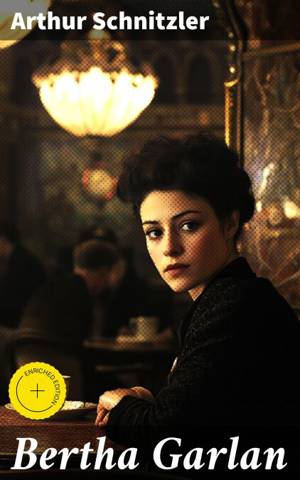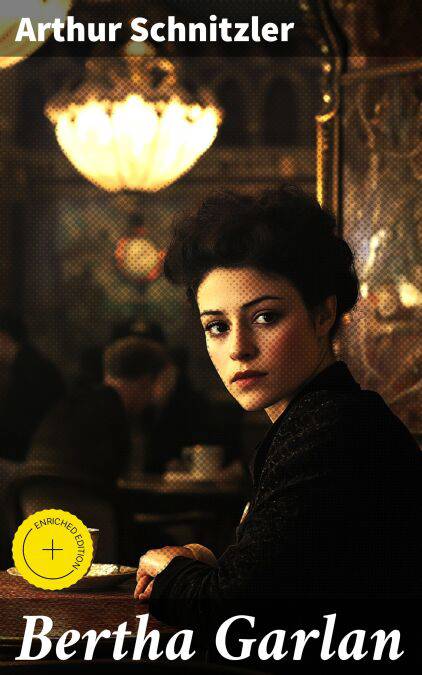
Je cadeautjes zeker op tijd in huis hebben voor de feestdagen? Kom langs in onze winkels en vind het perfecte geschenk!
- Afhalen na 1 uur in een winkel met voorraad
- Gratis thuislevering in België vanaf € 30
- Ruim aanbod met 7 miljoen producten
Je cadeautjes zeker op tijd in huis hebben voor de feestdagen? Kom langs in onze winkels en vind het perfecte geschenk!
- Afhalen na 1 uur in een winkel met voorraad
- Gratis thuislevering in België vanaf € 30
- Ruim aanbod met 7 miljoen producten
Zoeken
Bertha Garlan E-BOOK
Enriched edition. Love, Marriage, and Societal Constraints: A Vienna Novella of Feminist Exploration and Human Nature
Arthur Schnitzler
E-book | Engels
€ 0,49
Uitvoering
Omschrijving
Arthur Schnitzler's "Bertha Garlan" stands as a poignant exploration of desire, manipulation, and the complexities of human relationships within the backdrop of early 20th-century Vienna. This novella unfolds through a narrative steeped in psychological depth, employing Schnitzler's trademark Impressionistic style that blurs the lines between reality and perception. Schnitzler deftly navigates the intricacies of social mores and the emerging modern sensibilities of his time, providing a critical lens on themes of infidelity and the struggle for authenticity in a world constrained by societal expectations. Born into a Jewish family in 1862, Schnitzler's background and training in medicine deeply informed his character studies and narrative structures. His works often reflect a keen awareness of the psychological nuances of passion and betrayal, likely influenced by his personal experiences in the vibrant yet tumultuous milieu of Vienna. Known for challenging societal norms, Schnitzler's engagement with themes of sexuality and morality made "Bertha Garlan" a timely reflection of the shifting attitudes surrounding gender and relationships at the turn of the century. "Bertha Garlan" is recommended for both scholars and general readers alike, as it provides invaluable insights into the human psyche and the often fraught dynamics of love and betrayal. Schnitzler's masterful storytelling invites readers to immerse themselves in the emotional turmoil of his characters, making this novella an essential read for those interested in the intersection of literature, psychology, and the cultural landscape of early modern Europe.
In this enriched edition, we have carefully created added value for your reading experience:
- A succinct Introduction situates the work's timeless appeal and themes.
- The Synopsis outlines the central plot, highlighting key developments without spoiling critical twists.
- A detailed Historical Context immerses you in the era's events and influences that shaped the writing.
- An Author Biography reveals milestones in the author's life, illuminating the personal insights behind the text.
- A thorough Analysis dissects symbols, motifs, and character arcs to unearth underlying meanings.
- Reflection questions prompt you to engage personally with the work's messages, connecting them to modern life.
- Hand‐picked Memorable Quotes shine a spotlight on moments of literary brilliance.
- Interactive footnotes clarify unusual references, historical allusions, and archaic phrases for an effortless, more informed read.
In this enriched edition, we have carefully created added value for your reading experience:
- A succinct Introduction situates the work's timeless appeal and themes.
- The Synopsis outlines the central plot, highlighting key developments without spoiling critical twists.
- A detailed Historical Context immerses you in the era's events and influences that shaped the writing.
- An Author Biography reveals milestones in the author's life, illuminating the personal insights behind the text.
- A thorough Analysis dissects symbols, motifs, and character arcs to unearth underlying meanings.
- Reflection questions prompt you to engage personally with the work's messages, connecting them to modern life.
- Hand‐picked Memorable Quotes shine a spotlight on moments of literary brilliance.
- Interactive footnotes clarify unusual references, historical allusions, and archaic phrases for an effortless, more informed read.
Specificaties
Betrokkenen
- Auteur(s):
- Uitgeverij:
Inhoud
- Aantal bladzijden:
- 214
- Taal:
- Engels
Eigenschappen
- Productcode (EAN):
- 4064066229436
- Verschijningsdatum:
- 4/12/2019
- Uitvoering:
- E-book
- Beveiligd met:
- Digital watermarking
- Formaat:
- ePub

Alleen bij Standaard Boekhandel
Beoordelingen
We publiceren alleen reviews die voldoen aan de voorwaarden voor reviews. Bekijk onze voorwaarden voor reviews.









